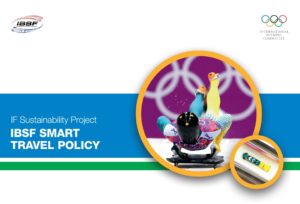
The International Bobsleigh & Skeleton Federation (IBSF) regularised a number of new policies relating to travel and transportation within the federation. The policies were created as a strategic response to the high travel costs that had been observed in the 2010 annual financial report. Previously, the more than 90 jury staff assigned to competitions, the IBSF Executive Board and the IBSF staff members could organise their own travel to competitions and other events, and then be reimbursed by the IBSF. The new approach centralises all travel arrangements, with a specific employee dedicating part of her time to arranging transportation in the most efficient and sustainable way possible.

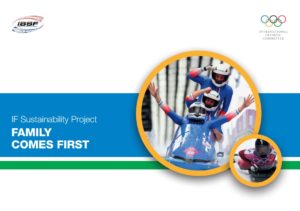
The International Bobsleigh & Skeleton Federation (IBSF) believes that an energised and motivated staff will result in productive and efficient ways of working. The goals of this “Family Comes First” approach have been to increase the morale of IBSF staff members, to keep them motivated about their jobs, and to create a positive work environment. For example: Short, informal meetings with all employees are held for 10-15 minutes each day, allowing members of staff to chat about non-work-related topics.

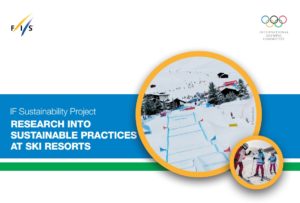
As part of FIS Green, the FIS’s comprehensive new sustainability strategy due to be launched in early 2017, the FIS decided to create a database of sustainability initiatives implemented by ski resorts across the globe. The database features projects conducted by more than 700 ski resorts, which were selected from the existing database of resort information available to the FIS. A total budget of 5,000 CHF was allocated to the project. The information was compiled through online desk research from the websites of the ski resorts. This method was specifically chosen as the FIS preferred to focus on information that was already publicly available, which confirmed that the ski resorts had sought to communicate their initiatives. The collected information has been divided into four focus areas: alternative methods of energy; recycling practices; alternative methods of transport in the resort; and existing partnerships with public transportation.




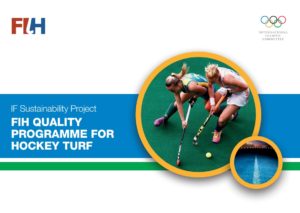
New hockey fields are major investments, and it is important they meet the expectations of players, clubs and associations. To help ensure excellent fields for all levels of play, the International Hockey Federation (FIH) launched its Quality Programme for Hockey Turf in October 2015 as part of Hockey Revolution, its ten-year strategic vision for the sport. The programme certifies suppliers, manufacturers, field builders and hockey turfs based on their compliance with a set of criteria, which include the use of sustainable best practices, staff experience, weather resistance and raw materials. The programme also offers certification for hockey fields through FIH Accredited Test Institutes, which meet the FIH’s international standards and are evaluated regularly.


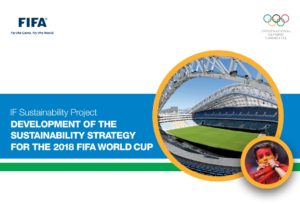
Highlighting its commitment to sustainability, FIFA made the decision in 2009 to include it in its future bidding agreements, starting with the 2018 FWC bidding process. This required each bidding country to provide comprehensive information on activities aimed at social development, economic sustainability and environmental protection as part of the staging of the FWC. In December 2010, the Russian Federation was selected to host the 2018 FWC. Then, in late 2013, FIFA began working with the LOC to create a sustainability strategy for the event. The 2018 FWC in Russia was planned in close connection with long-term national development strategies and programmes, with the ultimate goals of creating social, environmental and economic benefits for host cities and regions and creating a new standard for large events within the country.




Despite increasing environmental awareness among citizens, no fully-fledged system of separate waste collection currently exists in Russia. It is said that waste disposal sites in Russia currently occupy around 30,000 square miles, and waste processing facilities in Moscow are close to full capacity. It has become increasingly important for Russia to take action in addressing and solving its waste management problem. As part of FIFA’s sustainability initiatives for the 2018 FIFA World Cup in Russia, approximately 20 percent of all waste collected during the hosting of the Preliminary Draw in Saint Petersburg was recycled through a system put in place by the LOC. The project was part of the Sustainability Strategy developed by FIFA and the LOC.

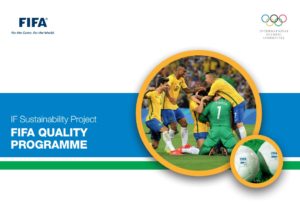
Social responsibility is a key issue for FIFA, which believes that football can bring about positive social change. As part of this responsibility, FIFA has implemented the FIFA Quality Programme to protect the interests of its stakeholders and to ensure that correct measures were being taken in the production of football equipment, surfaces, technology and services used for the sport. The FIFA Quality Programme has been built on in depth studies, surveys and analyses of players’ needs, and also encompasses aspects of safety, performance, durability, quality assurance and playing comfort.



Pioneering audio-descriptive commentary was offered in Portuguese at 26 of the 64 matches during the 2014 FIFA World Cup Brazil™, describing the atmosphere in the stadium and the action on the pitch. FIFA appointed the Centre for Access to Football in Europe (CAFE) as consultants to deliver and manage the commentary at the four host stadiums in Belo Horizonte, Brasilia, Rio de Janeiro and São Paulo.

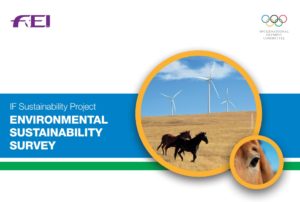
The International Equestrian Federation (FEI) established a sustainability programme in 2013, born from its desire to make a serious contribution towards conserving the sound environment necessary for the practice and continuity of equestrian sport. The sustainability programme encompassed various initiatives to support event organisers reduce negative environmental impacts and create a positive legacy. As part of the process, the FEI commissioned a survey to further understand the status of environmental sustainability and ascertain future needs among event organisers.






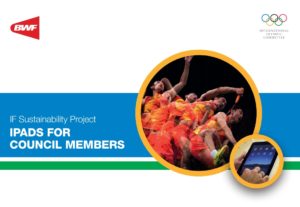
To prepare for council meetings (on average, three per year) and the eight standing committee meetings attached to each one, the Badminton World Federation (BWF) staff had to compile folders containing a large volume of information for each council member. The 26 council members and four BWF staff members who attended council meetings each received a folder containing approximately 500 sheets of paper, which equates to approximately 15,000 sheets of paper for each week of meetings. It took BWF staff almost two full days to prepare the folders, which then had to be shipped to the meeting location – often a costly process. The folders were heavy and caused security concerns, as members were not always able to dispose of them appropriately They also created unnecessary waste: some folders had to be shredded because members did not want to take them home
